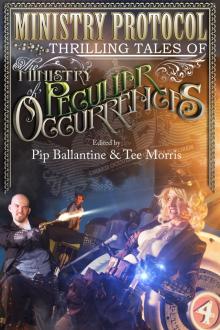- Home
- Tee Morris
The Case of the Pitcher's Pendant Page 2
The Case of the Pitcher's Pendant Read online
Page 2
“The problem is, they're too good.” Joe didn’t notice I was looking at him in the mirror’s reflection of the room. He was blushing. This really was tough for him. “I’m going to sound like I’ve got sour grapes or something, but I just can’t buy that this kind of talent has gone unsigned.”
“What makes these Baltimore Mariners so good?” I said, giving my face another scrubbing as Joe continued.
“Their pitcher, for one thing. Never seen an arm like this guy’s. If you’re lucky, you catch a glimpse of his fastball. There’s a rumor their catcher had to reinforce his glove with extra leather so he wouldn’t break his fingers. When you watch this guy pitch, it’s amazing.”
Joe was right. This was sounding like a bad case of sour grapes. “Well now, I’m sure you’ve got scouts coming out of their cross-country tours who all have a lead on the next best player. From what I read in the Sports page, the Midwest is just a breeding ground for the next Lefty Groves, Willie Kamms, or Goose Goslins.”
“It’s not just the pitcher. The entire team is like this. I caught two of their games and spent both slack-jawed. I’ve seen outfielders catch what should have been grand slams. I didn’t think it was possible to jump that high! Then there are infielders that make double-plays so fast even the umpires hesitate. And the batting averages, this early in the season, all promise to be record-breaking.
“I’ve been in this game for a while, and I’ve seen enough players and teams to know when something is just not…right.”
Conviction is not easily faked. Sure, you can probably convince yourself that anything is true, especially if your team is flailing in the National League standings like a mermaid out of water. It’s always better to blame something else—new talent, bad lineups, or sorcerers’ curses—than to serve yourself up as the reason why the hometown team isn’t meeting up to that previous championship season. (Yeah, so the Athletics managed to take the crown, but not without the Cubbies making the kind of final stand that heroes live and die for.) What I initially thought was a sorry excuse to a somewhat lackluster start to the season, though, revealed that conviction. He was right, or at least he believed with every ounce of muscle that tensed in the bottom of the ninth, every drop of sweat shed in Wrigley during the hot, oppressive summers of Chicago, and every thought he put behind the batting and fielding lineups, that there was something fishy about this new team on the scene.
And with a name like the Mariners, how appropriate.
I gave my face another splash of soapy water, pulled the towel free of its rack, and dabbed at my face before asking, “So, why hire a private dick?”
“Because the owners, when I was discussing the possibility of having their people look into it, felt the same thing you did: That I was looking for a scapegoat.”
Holy cow. That was direct. “Now wait a minute, Joe, I never—”
“Billi, you’re a fan. You have to really love this sport—not the job, and definitely not the pay—to be a manager. It’s not only a thankless job, but when the team does well no one gives you a pat on the back. I’m lucky if I even get a nod from the owners. And when the team can’t seem to pull themselves out of the fire, the fans blame you after they finish blaming the guy they were cheering on in the last game.”
Guilty as charged. I guess I never realized how much of a baseline commander I was. There'd been many a night that Mick and I praised the players in ’29, and then last month we'd been bad-mouthing this man in my office for resting on his team’s success as League Champs. Thinking back, I couldn’t recall a moment where I’d said anything like, “Well now, Joe really was thinking when he put together this lineup!” It was like those rare, devoted generals who actually cared about their men; who came up with strategies that not only won battles but kept casualties to a minimum. Those were the generals I didn’t mind spilling my blood for, and rarely did they get the credit they deserved. Meanwhile, most of the guys in the trenches only saw their own toil, only noticed when things went wrong. They never saw the bigger picture, or grasped the fact that the orders we followed were coming from someone who gave a damn about his men.
Fans can really be assholes. Present company included.
Miranda’s voice snapped me back into my present world. She must have been getting a real earful from Harv, and I afforded her a smile when she said calmly, “Well then, should I remove Billi’s other engagements as well? I’m sure you can find someone to cover. How many Dwarves do you have in your call books?” A pause, and I stifled a laugh as she replied, “Well, how tall are you, Harv?”
That’s my girl, Miranda. Cooler than the Ice Queen of the White Mountains of Arctia, and just as deadly when challenged.
“For a while there, I thought they were right, but when I read about their last game…” Joe’s voice faded away. I stepped off the crate and walked up to the side of his chair. He was torn about getting a private dick involved. This could cost him his job. But didn’t he just say it wasn’t the job? It was the game. It was all about the game. “I just know there’s something odd about that team. Maybe the owners are thinking this is just me pointing fingers, maybe the commissioner is looking the other way because he doesn’t want another Black Sox scandal, I don’t know.” He finally made eye contact with me. Pretty easy as he was sitting and I was standing. “I do know that right now, things are hard. On everyone. I don’t know where people are getting the bucks together to even come to a game, but they are. This game means a lot to them. It means a lot to me.”
I nodded. “Baseball isn’t a game. It’s a kind of magic, Joe. You know that. To an extent, so do I. I’m just a fan, I admit, so maybe I don’t know all the ins and outs of the sport. Trust me when I tell you, though, that I know a thing or two about magic.” I shot him a knowing wink and grinned. “And I’m here to tell ya, there is something magic about baseball. Something magical. Something sacred.”
Joe turned his attention to the hat in his lap, his grin matching mine. Yeah, it might have sounded a little corny, but I spoke the truth.
“With the way things are,” I started, “I’d like to see the Baltimore Mariners for myself, just to see if they’re as suspicious as you claim they are.”
He held up two tickets to Wrigley for Tuesday, May 13, and slid them next to my desk lamp. “They’re going to be here for two games. Let me know what you think.”
“My wages are $15 a day with a hundred and fifty down.” I thought he would balk, but I had that nest egg to rebuild. “This commits me to two weeks of working with you, and you take care of any expenses, as well.”
“Sure, Billi,” Joe said, still staring at the tickets. “So long as you’re not too crazy with those expenses.”
“I’m a cheap date. Nothing to worry about.”
His hat returned to his head, and after taking a moment to straighten it, he bent down to shake my hand. “Thanks for taking this on, Billi. I’m relying on your discretion in this matter.”
“That’s one of the things you’re paying me for.” Motioning to Miranda, I walked him to the door. “You can make your down payment and work out all the details with Miranda.”
She was off the phone now, and her voice could not have sounded more pleasant. In fact, there was a delightful lilt to her tone with the manager of the Chicago Cubs. Only the bank calling to say, “We found your savings!” could have made her happier.
This was a step in the right direction. Don’t think we weren’t grateful. I gave the Guardians a “thank you” for two reasons: for giving Baddings Investigations a case while the bookings with Waldorf were strong, and for making it a case that involved baseball.
If there was magic in this world, it happened within sight of the three bases and home plate. All the gems in my world that decorated the walls and floors of dragons’ lairs, the sword hilts of privileged princes, and crowns worn by emperors and kings, were nothing compared to the beauty and splendor of the diamond in Wrigley Stadium. It wasn’t just a yard with dirt, chalk lines, bases, and a small hill i
n its center. Wrigley was a field of dreams. Dreams of eternal glory for the men who ran to the outfield, who took their respective bases, and prepared for battle against those who would dare enter their hallowed realm. Dreams for the kids in the stands, all wanting to don a uniform, kiss their moms goodbye, and wield their bats as enchanted weapons destined to knock the cover off the ball. And for the adults who had already selected their lot in life, Wrigley made the dreams of past innocence, lost wonder, and the promise that there was something inherently good still left in this world, come true.
Yeah, corny as hell. But all true.
I loosed another glance toward the clock. Rothchild’s in a few hours. Enough time to get an early dinner at Mick’s, get back here, and then catch a cab to the manor I wished I wasn’t so familiar with. Eva was probably going to be there, and if I was lucky her head was thicker than a Troll’s turd and she wouldn’t recognize me underneath all the makeup. I had been cringing about this engagement all through April…
Then I tucked the tickets into the inside pocket of my coat. It didn’t matter that much anymore. I had a client. I had a date with Miranda at Wrigley Field (whether she knew it or not). Just thinking about this case made me smile.
Baseball. I absolutely love this game.
Chapter Two
The Things You Hear at Waist Level
The last time I set foot in the Rothchild Mansion, I was played for a sucker; and when Harv told me I would be performing here I was none too happy about it. But when Harv told me how much green I was going to collect from this one performance, I shut my mouth with a Troll-sized bite of pride pie.
That was before I scored the case with Joe McCarthy. A case with the Chicago Cubs—it was a fan’s dream. Well, okay, so it wasn’t an official job with Wrigley Field. If word got out that McCarthy was hiring private dicks to investigate other teams, the Sports sections of the Tribune and the Daily would blow it completely out of proportion and the higher-ups in the Cubs hierarchy would probably serve McCarthy his walking papers just to save face.
Keeping my involvement with the team as under wraps and low-key as possible was paramount. No lives were in danger, but a man’s livelihood was on the line; and this livelihood was this man’s passion. That’s when I came to grips with the truth: my client wasn’t the Cubs, but the pastime itself. McCarthy was going on a hunch, a deeply rooted concern for the sanctity of the sport. Baseball was doing its best, trying to make it through the hard times of 1930. If a terrific team suddenly hit a slump or if a favored team in a World Series were to get whipped harder than a pack beast on an incline, memories of the Black Sox scandal would no doubt spring into people’s minds.
It was 1919 B.B. (Before Billi) when the Chicago White Sox faced off against the Cincinnati Reds in the World Series; and with the Sox infantry including foot soldiers like Claude “Lefty” Williams, Oscar “Happy” Felsch, and the great “Shoeless” Joe Jackson, there was no question that it would be a World Series for the Ages. It was also a healthy bet that Chicago would have a lot to celebrate come October, but it turned out to be a heartbreaker. The Reds won five games over the Sox’s three. Not to say it wasn’t a real nail-biter, at least from what I saw in the library archives, but the last game—at the Sox’s own shire of Comiskey Park—seemed a little odd. “Odd” as in that sudden shift in the weather before a major battle, when that clear sky you were blessed with the morning you set up camp was suddenly swapped out for a fog bank thicker than split-krea soup come sunset. If you didn’t have a really good wizard on hand to clear things up, it made for a long night, especially if the enemy attacked.
The 1919 Series opened with a score of 9—1 and a win for the Reds, and that raised a few eyebrows. It was the back-breaking 10—5 loss at the Sox’s own field that got the wrong kind of people asking questions. The guy asking the loudest was a Sports scribe for the Herald and Examiner, Hugh Fullerton. He was the first to toss around the word “fix” in his write-ups, even in his post-season columns. Like many kings, lords, and nobles who tend to stuff their ears with fine silks on hearing rumors of revolution, team owners were trying to pretend that there was no possible way baseball could be so easily corrupted. As for the notion of someone fixing a World Series, it was inconceivable.
Fullerton’s opinions didn’t go away. Rumors in the 1920 season were now mentioning other teams taking a bounty for an error here, a poorly-pitched game there. Players were getting nervous. And before the ‘20 season concluded, a grand jury had convened to look into whispers and accusations against my beloved Cubs. What started with the Cubs ended with the Sox and a hard look at the 1919 Series. The scandal seemed to reach all the way up to that miser Comiskey himself (which got me to thinking: This dink was a former pitcher himself, and yet he treated his star players no better than castle slaves? What a prick!), but it was Jackson and pitcher Eddie Cicotte who stepped forward first and admitted everything.
Say it ain’t so, Joe. Say it ain’t so.
Even with Shoeless Joe and Cicotte spilling the beans like they did, nobody could really say who was involved and how deeply. The only thing clear as a prince’s chalice was how interested the country was in the dirty details: the disgruntled players, the tightwad owners, and the opportunistic gamblers. Front-page news on every newspaper in my library’s archives, and these were headlines from all across the States. The good news was, due to the lack of hard evidence, the Chicago Eight were acquitted of all criminal charges. The bad news: Kenesaw Mountain Landis. (No, really…that is his middle name.) The club owners replaced the three-man commission overseeing baseball with this federal judge, making him into a supreme overlord and giving him the kind of power that would give an Orc a bulge in his breeches. With the proclamation, “No player who throws a ball game, no player who undertakes or promises to throw a ball game, no player who sits in confidence with a bunch of crooked players and does not promptly tell his club about it, will ever play professional baseball,” Landis banned eight players—regardless of the rulings of the court—from professional baseball. For life.
You could still start a tavern brawl by talking about the Black Sox. Some fans supported the overlord and his club-running minions, agreeing that there was no room in baseball for cheaters. But there were fan factions that sided with the players, especially with those who had been banned from the sport even though their roles in the conspiracy had never been clearly defined. The Sox delivered a pennant to Chicago, but Comiskey showed his appreciation with lousy wages, shitty treatment, and flat champagne. Could you really blame these guys—these eight incredible players—for giving into temptation? Yeah, it was a mess; and even after ten years and an economic crash, it was still a sore subject. I hadn't even been here for it and it got my codpiece in a twist.
A lot was riding on what I found out about this team, the Baltimore Mariners. If they were, in fact, that good of a team, then I would have to break it to McCarthy that he didn’t need a private dick, but a charmed trainer and a better game plan. If other owners, managers, and team members were throwing games, this was going to be a real nightmare for the pastime, and the Great Depression was only going to get worse.
There was a growing tightness in my stomach as my coach-for-hire drew closer to the mansion gates. I took a deep breath and muttered something that, oddly enough, provided me with a hint of comfort. “Servants’ entrance.”
The cabbie glanced in his rear view and then slowed down. The fork in the road wasn’t that far past the entrance gate, and if you blinked you missed it. I guess an obvious path for the hired help would be considered extremely poor taste, so the path was subtle enough for visitors to miss it, while the common folk knew where to look. Having it closer to the gate meant that the privileged would never see their staff making their meager way to the house. Serfs would just magically appear, ready to serve their lord and master with a stoup of wine.
Silently and methodically, butlers and maids in pristine white and black outfits filed into the mansion, giving a nod to the resi
dent Jeeves as they did. I hopped out of the cab, grabbing the head butler’s attention. Even with the hired help giving him the proper obeisance, Jeeves’ eyes stayed on me.
The old boy’s sneer grew more and more obvious as I approached. “How ya doin’? I’m the entertainment,” I told him, presenting the Showenstein Talent Agency invoice that doubled as a work order for me.
“Yes.” He sniffled. “Quite.”
Oh, Jeeves, you really don’t want to rub me the wrong way this early in the evening.
“I’m supposed to do my routine at seven, and then work the crowd until—”
“There is a water closet at the end of this corridor,” Jeeves said, bringing his eyes back up to Human-level. “Feel free to make yourself ready there.”
Hey, I’ve got my own can for a dressing room. I’m coming up in the world. “Thanks, bub.”
The chatter didn’t get any friendlier once I got into the lower bowels of the Rothchild Mansion. It was strictly business with the staff; and much like a military unit, the various foot soldiers were getting their assignments. The younger crew was cutting eyeteeth on this evening’s festivities, so their posts were the farthest from the main hub of activity. The veterans merely nodded at their placements, duties, and priorities. It was nothing new to them. Keep the food hot and fresh, and don’t blink at serving the bubbly to the odd senator or police commissioner, even though they made and enforced the laws that were supposed to prevent such libations from being available.
I had already checked in with my field commander at the door. I was the scout in this soirée’s infantry, getting close with the enemy; so close I could smell their BO from a few hundred paces. Even further if I was downwind of them.
A soft click later, and I was alone with the toilet, bathroom sink, and a mirror far too high to make a difference.
After rummaging through my carpet bag of assorted costume pieces and makeup items, I found the small mirror that conveniently came with its own stand and propped it on the center of the lid. I had invested in this handy little contraption after one party too many where I couldn’t find an adequate box to bring me up to Human mirror height. A handsome Dwarf smiled back from inside its frame. There was (as toilet lids usually allowed for) room enough for tins of makeup. White face. Rouge. And some black and brown makeup, depending on how severe I wanted to make the eyebrows.

 Ministry Protocol: Thrilling Tales of the Ministry of Peculiar Occurrences
Ministry Protocol: Thrilling Tales of the Ministry of Peculiar Occurrences The Case of the Singing Sword (The Billibub Baddings Mysteries)
The Case of the Singing Sword (The Billibub Baddings Mysteries) The Janus Affair: A Ministry of Peculiar Occurrences Novel
The Janus Affair: A Ministry of Peculiar Occurrences Novel Aladdin and His Wonderfully Infernal Device
Aladdin and His Wonderfully Infernal Device The Case of the Pitcher's Pendant
The Case of the Pitcher's Pendant